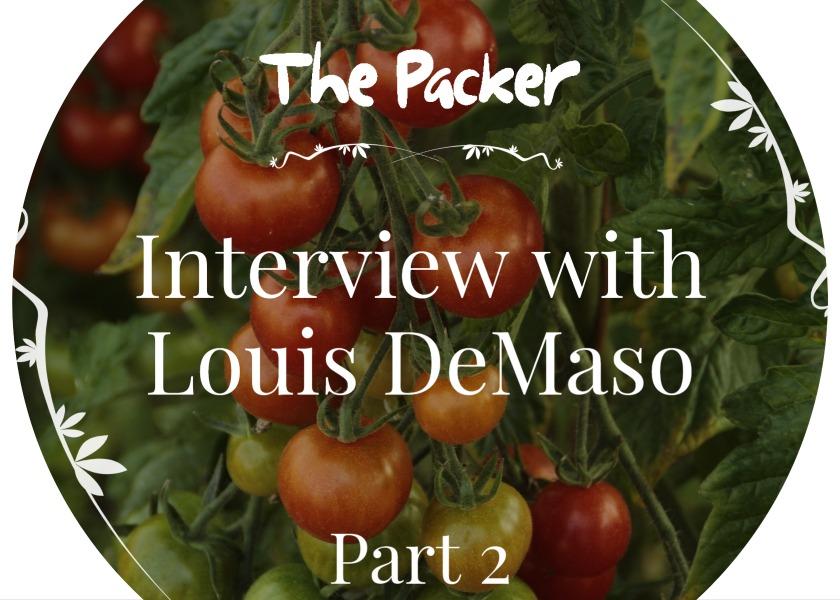Part 2 Seeking out sustainable solutions

Part two of The Packer's interview with Louis Demaso. The Packer’s Tom Karst visited recently with Louis DeMaso, sustainability and operations analyst for Lipman Family Farms, Immokalee, Fla., about Lipman’s work in sustainability and what drivers have played a part in their initiatives.

The Packer: It’s an interesting challenge, because on one hand, you can’t overwhelm consumers with a lot of data on the package. But for those consumers that are interested in, maybe you’re going to dig deeper, you want to have that available for them. How do you how do you share the message with consumers and your customers about what you’re doing, and, as you mentioned, the KPIs and kind of all the hard data that you’ve been looking at?
DeMaso: I think focusing on the results is important, because the consumers have a lot going on and trying to understand a lot of the practices that are involved with farming, and which ones are beneficial and which ones aren’t, can be complicated and time-consuming. Focusing on the results of those actions, and the results of those practices, I think, is the way to go. So instead of reporting on the different things that you’re doing to save water, just focusing on the water that’s saved, and of course, providing information and transparency about those practices. So, for those “power” consumers, I’ll call them, who are interested in learning more, they have that access. I think that’s really key as well as the transparency, because there will be the vast majority of people who might just glance at something and make an assumption and that’ll be enough, but without the ability for them to dig deeper and learn more, you lack credibility.
The Packer: As you think about packaging in the context of other sustainability initiatives — you mentioned water, of course — describe the kind of the bigger picture of what Lipman Farms is doing, relating to sustainability and what projects you’ve got.
DeMaso: Packaging is definitely one that we’re focused on, considering it’s a very consumer-facing piece and it’s our way to connect with customers, so we definitely want to make that a priority. And we’ve also heard from consumers that (this) is a priority of theirs, so we’re trying to align ourselves with them. In terms of some other initiatives that we’re working on, one of them is food waste reduction.
And one way we’re working on that is by participating in the recent Stewardship Index for Specialty Crops food waste metric pilot. We’ll be testing a metric on our farms that will allow us to quantify the amount of fruit that’s left behind in the field. The pilot project (will help) to get a handle on why things might be going on that could contribute to food waste.
Another waste reduction initiative we’re working on is the repurposing of byproducts. There’s a lot of organic materials that wind up being discarded at various parts of the supply chain, whether it be pieces of fruit that were cut off in processing operations, like the tops of bell peppers, or other pieces that aren’t directly edible, or off-grade products that are either not the right shape or size or spec for the customer.
Finding alternative markets for those — which can include anything from animal feed to nutrient extraction, or energy recovery, and other consumer goods — finding ways to turn those waste streams into valuable production streams for other industries is our goal as well.
The Packer: Very fascinating. There are a lot of projects that you are active with; it sounds like the whole company is committed to these steps.
DeMaso: It’s really built into a lot of what we do with our farming side with precision agriculture. It’s a hot topic, and really has been our focus for a long time in terms of just increasing our efficiency and trying to increase our yield. So, with that, there’s water use reduction, fertilizer use reduction initiatives. Our irrigation technology is a big way that we can try to save water and nutrient applications that is automatic and adjusts to weather in the region. So, when there is more or less rainfall or hotter, drier days, it’ll irrigate and apply fertilizer differently to ensure that we’re only applying what the plants need.
The Packer: You mentioned earlier you tune into the news about sustainability in The Packer. If there’s one area maybe that you’re really keen on learning more about relative to sustainability and the various initiatives that are out there in the industry, what really piques your interest? And what are you looking at in terms of areas of learning for you?
DeMaso: I think that really the space of data and machine learning and artificial intelligence and how it could lead to better management decisions is really interesting to me personally, and also, I think, will be important in the industry moving forward.
Growers are starting to have to go through the digitization of food systems to have access to more and more data. Taking this (data) and turning it into actionable insights and business management decisions will be important, because if you can make better predictions to understand what the plants need, when they need it, how much harvestable fruit you’re going to need in general, because of market conditions and times of year and this and that, then you can fine-tune all of your management practices to reduce waste of all sorts throughout the supply chain.







